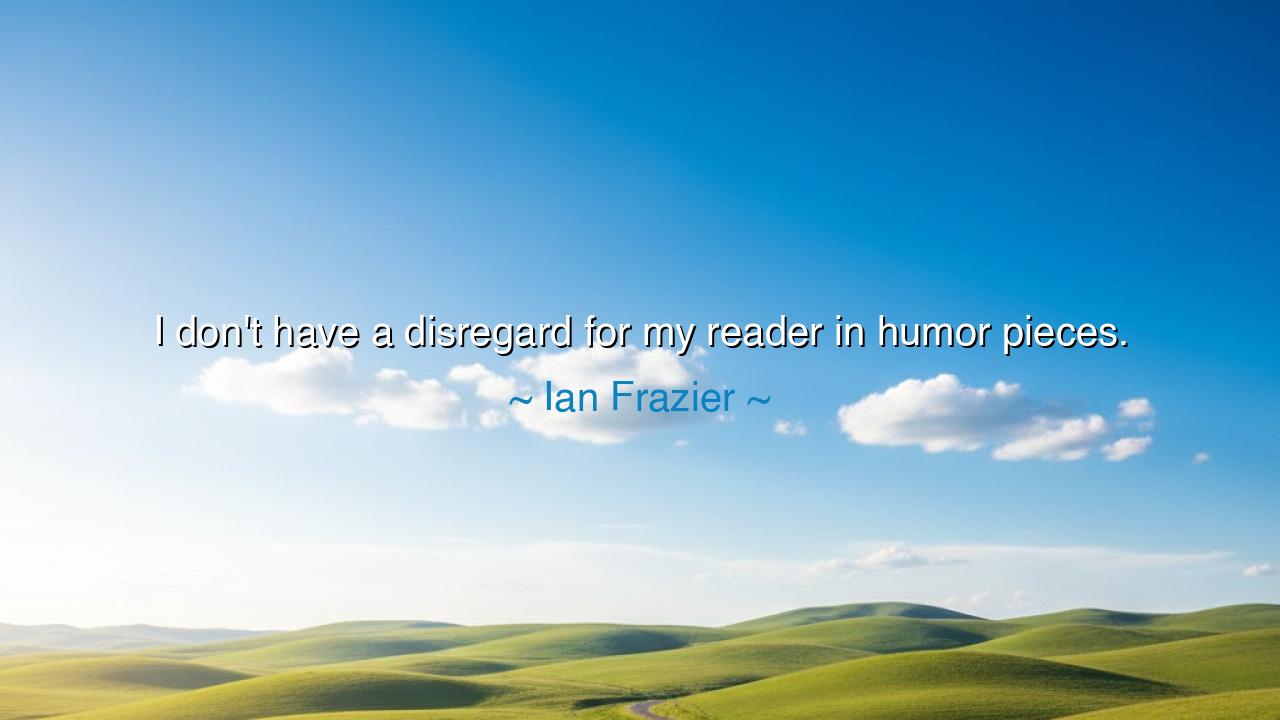
I don't have a disregard for my reader in humor pieces.






When Ian Frazier said, “I don’t have a disregard for my reader in humor pieces,” he spoke as both a craftsman of words and a guardian of empathy. His statement, though modest, reveals a truth as old as storytelling itself — that the bond between writer and reader, between speaker and listener, is sacred. Humor, he reminds us, is not an act of dominance, but of communion. It is a bridge, not a weapon. The humorist’s task is not to mock from above, but to reach across the gap of experience and share in the laughter of recognition. Frazier’s words stand as a rebuke to arrogance and cruelty masquerading as wit, and as a call to those who write, speak, or jest to remember the dignity of those who listen.
The meaning of his quote lies in the balance between humor and respect. To write humor without disregard is to acknowledge that laughter is a form of trust. The reader opens their heart and mind, inviting the writer to play within their imagination. To betray that trust with contempt, vulgarity, or laziness is to wound the very soul that came seeking joy. True humor, as Frazier implies, is an act of generosity. It draws laughter not from ridicule, but from understanding — it says, “I see you, I know you, and together we will laugh at the strange miracle of being human.” This is not humor that isolates or wounds, but humor that connects, that binds hearts through shared folly and warmth.
In this, Frazier stands in the tradition of the ancient storytellers — those who used laughter to teach wisdom and to heal. In the markets of Athens, Socrates would question men until they laughed at their own contradictions. His humor was not cruel, but enlightening. He used irony to awaken truth, and in that laughter, his listeners found humility. Likewise, the playwright Aristophanes, though sharp in wit, never despised his audience. His comedies exposed the absurdities of war, politics, and pride, yet always with an affection for the human spirit. Their laughter was not mockery, but medicine. So it is with Frazier — his humor, like that of the ancients, is rooted in love for his audience and reverence for the art of truth through laughter.
In modern times, we have seen humor lose this sacred quality. Much of what passes for comedy today is born from cynicism — jokes that cut, not heal; laughter that divides, not unites. There are those who wield humor as a sword rather than a lamp, who confuse cruelty with cleverness, and insult with intelligence. But Frazier’s words remind us of another path: the humorist as humanist. He tells us that to make others laugh without belittling them is an act of grace, an art that demands wisdom, compassion, and discipline. To disregard one’s reader, one’s audience, is to forget that humor is not about the self, but about the shared moment of delight that lifts both teller and listener into a brighter world.
Consider the story of Abraham Lincoln, whose wit carried a nation through darkness. During the Civil War, when his cabinet debated bitterly, Lincoln would disarm tension with a story — often humorous, sometimes absurd, but always humane. His jokes were never meant to belittle, but to remind those around him of their shared purpose and humanity. In one instance, after a heated argument, Lincoln told a story about a farmer chasing his pig into the mud — “I didn’t get the pig,” he said, “but I sure got a lot of exercise.” The room broke into laughter, and tempers eased. That was humor with regard for the listener — humor that lifted rather than scorned, that turned anger into understanding. This is the spirit of Frazier’s philosophy.
The origin of such wisdom lies in humility. To regard one’s reader is to admit that they are an equal — not a target. It means writing with awareness, with respect for the intelligence and feeling of those who read. It is to say: I will not assume superiority over you, nor will I hide behind irony to mask cruelty. Frazier’s humor, like all enduring art, flows from empathy. It is rooted in the belief that laughter should reveal our shared humanity, not diminish it. Such a belief demands not only intellect, but heart — a courage that resists the temptation to please the crowd by wounding the few.
And so, my listener, take this lesson into your life: when you speak, write, or jest, remember those who listen. Whether your words are meant to teach, to entertain, or to heal, let them never carry disdain. Regard your audience as companions on the path — those who trust you to lead them, even if only for a moment, through the lightness of laughter. Let your humor come not from superiority, but from understanding. Laugh at yourself before you laugh at others. Use wit to illuminate truth, not to obscure it.
For in the end, Ian Frazier’s teaching is not only for writers — it is for all who wield the gift of language. Words are bridges between souls; laughter is the music that crosses them. To speak without regard is to break that bridge; to write with empathy is to build it higher than before. So let your humor be wise, your laughter kind, and your words full of care. For the truest jest does not wound — it enlightens. It leaves the listener not smaller, but larger; not humiliated, but human. And that, my friend, is the sacred art of laughter that time itself will never forget.






AAdministratorAdministrator
Welcome, honored guests. Please leave a comment, we will respond soon